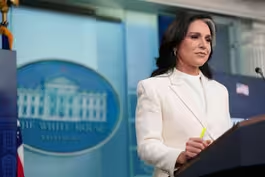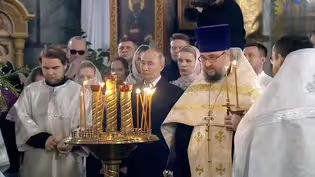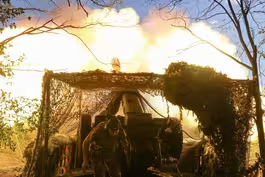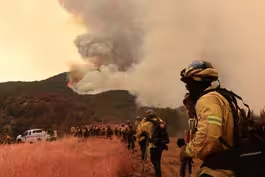
A look at D.C. crime as Trump and city give competing claims
Clip: 8/19/2025 | 8m 49sVideo has Closed Captions
A look at D.C. crime stats as Trump and city leaders offer competing claims
President Trump paints the nation’s capital as a city beset by crime and called in National Guard troops. D.C. leaders contend there is no crisis, pointing to crime rates at 30-year lows. But Charles Lehman of the conservative Manhattan Institute argues neither side is telling the complete truth. Amna Nawaz spoke with Lehman about how both the locals and feds could pursue smarter solutions.
Problems playing video? | Closed Captioning Feedback
Problems playing video? | Closed Captioning Feedback
Major corporate funding for the PBS News Hour is provided by BDO, BNSF, Consumer Cellular, American Cruise Lines, and Raymond James. Funding for the PBS NewsHour Weekend is provided by...

A look at D.C. crime as Trump and city give competing claims
Clip: 8/19/2025 | 8m 49sVideo has Closed Captions
President Trump paints the nation’s capital as a city beset by crime and called in National Guard troops. D.C. leaders contend there is no crisis, pointing to crime rates at 30-year lows. But Charles Lehman of the conservative Manhattan Institute argues neither side is telling the complete truth. Amna Nawaz spoke with Lehman about how both the locals and feds could pursue smarter solutions.
Problems playing video? | Closed Captioning Feedback
How to Watch PBS News Hour
PBS News Hour is available to stream on pbs.org and the free PBS App, available on iPhone, Apple TV, Android TV, Android smartphones, Amazon Fire TV, Amazon Fire Tablet, Roku, Samsung Smart TV, and Vizio.
Providing Support for PBS.org
Learn Moreabout PBS online sponsorshipAMNA NAWAZ: President Trump paints the nation's capital as a city beset by crime, declaring an emergency and calling in National Guard troops under those emergency powers.
D.C. leaders contend there is no crisis, pointing to crime rates trending down now at a 30-year low.
Charles Lehman of the conservative Manhattan Institute argues neither side is telling the complete truth.
He joins us now to discuss the extent of Washington's challenge with crime and how both the locals and feds could pursue smarter solutions.
Charles, welcome to the "NewsHour."
Thanks for joining us.
CHARLES FAIN LEHMAN, Fellow, Manhattan Institute: Thanks so much for having me on.
AMNA NAWAZ: So, this D.C. takeover, as you have heard, was justified by the president as a response to crime.
From what you have looked at, how you have studied it in your view, was that takeover justified?
CHARLES FAIN LEHMAN: That's a big complicated question.
I think whether or not it's justified comes down to how those resources get used, how MPD, the city's police department gets used, how the additional federal agents get used.
The reality is that there is a history of local-federal cooperation on law enforcement issues that have yielded real results.
This is obviously a much more aggressive approach on the president's part.
That doesn't mean it can't work.
The capital is ultimately subject to the whims of the federal government in a way that no other city in the United States is.
But a lot depends on how the folks at the federal level, and, to some extent, they're still cooperating, entities at the local level are thinking about where they deploy their resources, where the real problems are, what problems they're trying to solve, and how they cognize success over the next 30 days.
AMNA NAWAZ: So if you were looking at where some of those troops and forces were deployed, if it was to address crime, where should they be deployed and is that where they're actually showing up?
CHARLES FAIN LEHMAN: The reality is that in every city in the United States, in every city on Earth, crime is a highly concentrated phenomenon.
That's one of the few iron laws of criminology.
In about 10 percent of the blocks in a city, you will see about 50 percent of the crime.
And that's true in D.C. as well.
I have done some research that shows more than half of homicides in 2023 were in just two wards, Ward 7, Ward 8.
Just 10 blocks, not 10 percent, just 10 blocks were home to 14 percent of homicides in that year.
So a lot of what the city would like to be able to do, what the federal government ought to be able to do is to concentrate resources there.
There are mixed signals about where we're seeing federal resources.
There's obviously a lot of social media footage of agents in strange places on the National Mall, on U Street.
It's a little bit hard to generalize from that.
The messaging from the administration is, we're taking criminals off the street.
Again, it's a little bit hard to get a systematic sense.
So the other question in my mind that isn't all answered is, is deploying these federal troops in non-major crime areas freeing up constrained MPD resources to go to those more major crime areas, Ward 7, Ward 8, Northeastern D.C., areas where you have serious entrenched gang violence problems?
I think we have mixed messages about whether that's really happening and it's a little bit hard to tell in the proverbial fog of war.
AMNA NAWAZ: I mean, there's also this issue of the statistics themselves, right?
You have seen the president call the crime numbers in D.C. fake crime numbers.
He said that online.
His Department of Justice is now reportedly investigating those numbers.
We should point out there was a 2020 lawsuit that was recently settled by D.C. police in which there was a former sergeant who claimed that the MPD, the D.C. police here, misclassified crimes, that districts were competing to get their crime stats down.
I guess the question is, are the stats dependable?
Is the president right in saying that these crime numbers are fake?
CHARLES FAIN LEHMAN: I'm relying here in part on research by a guy named Jeff Asher, who's a crime analyst based out of New Orleans whose data I and lots of other people go to for this.
And he's pointed out that -- there are some oddities in the data that MPD publishes.
They seem to be counting violent crimes differently, i.e., categorizing different things as violent crimes in the data that they publish versus the data that they give to the FBI.
And if you look at the FBI's data, they have seen a decline in violent crime, but it is much smaller than the decline that the city's data seems to suggest.
That's a discrepancy.
It's a reason to sort of question the fervor of city officials when they say, we don't have a crime problem.
On the other hand, it's a little bit hard to claim some malign cover-up when they're reporting the true numbers to the FBI.
And more to the point, it seems like the two consistently really strong indicators in the data, homicide and auto theft, are following the same trends no matter how you look at it.
It's also just quite plausible that D.C. is seeing the same trends that many other big cities are seeing, which is a large and consistent decline in violent crime.
So I think that there are legitimate questions about the magnitude of the drop.
I think that the city's strongest claims are probably overstated.
I think it is very hard to make the case that the data themselves are less reliable than any other crime number, which are always subject to a variety of caveats.
AMNA NAWAZ: There's also this issue, of course, of National Guard troop deployment.
We're now seeing more Republican governors step up to say that they will be sending their own National Guard troops to D.C. That includes West Virginia, Ohio, South Carolina, Mississippi, Louisiana, and Tennessee.
They don't have the same law enforcement authority that local officials do.
So, what kind of a difference can be made from their deployment when it comes to crime?
CHARLES FAIN LEHMAN: Right.
I think there's a good way to do this and a bad way to do this.
And again, the question for me is always, what are the tactics?
What's the strategy?
How are we thinking about what we know about policing?
The bad way to do this is as a show of force.
If you put a bunch of National Guard units in low-crime areas and you're just sort of trying to show off and say, look at what we can do, it's just a partisan boxing match, where the city is being used as the punching bag, to mix my metaphors.
That's not a good use of resources.
On the other hand, one of the major ways that law enforcement or non-law enforcement officers work is that they're deterrent.
If you put, to use the criminological language, a capable guardian in a place that is otherwise likely to be at risk for crime, you will reduce crime, even if they don't necessarily have the powers of arrest.
More importantly, you can use them to free up MPD officers, who do have the power of arrest.
They're below -- the MPD, the D.C. police department, is substantially below historical highs of sworn staffing.
They could really use the manpower.
And so, to me, the question is, are they trying to show off or are they trying to act as a supplement?
Are they trying to give MPD the breather that they need to really go after the major problems?
And that's the core, decisive factor.
AMNA NAWAZ: As you have probably seen, the administration is arguing, it's already working, the strategy is working.
We saw the attorney general, Pam Bondi, today online tout the success that they have seen.
She said 52 arrests were made last night, including, in her words, an MS-13 gang member.
She also claimed that there have been 465 arrests and 68 guns seized since this takeover began.
Charles, do those numbers say anything to you?
Do they say progress, that this is working?
CHARLES FAIN LEHMAN: Look, the reality is, you always need more context for a number like that.
You think about this, whether it's guns seized, or drugs taken off the street, or people justly arrested, that's good, that's great.
You need to have a sense of where the city was prior to this intervention.
And so just sort of giving those raw counts doesn't necessarily paint the full picture.
The things that I will be looking at over the next month and next several months is, where do the local crime trends seem to be going?
And how do they fit against what was happening prior to the intervention?
There's a real interesting opportunity here for what social scientists think about as a natural experiment, where there's been a sudden intervention.
And we will be able to compare D.C. before and after this to other cities to learn about what this intervention did.
You're not really going to get that information just looking at raw counts of arrests.
To some extent, you can go and talk to people.
I expect to be doing that.
Other journalists expect to be doing that, see how they're feeling, see what their sense of safety is.
But I will be waiting for more data to really draw a conclusion.
AMNA NAWAZ: All right, Charles Lehman of the Manhattan Institute, thank you so much for joining us.
Appreciate your time.
CHARLES FAIN LEHMAN: Thanks again.
Book explores James Baldwin's life through his relationships
Video has Closed Captions
Clip: 8/19/2025 | 7m 25s | 'Baldwin: A Love Story' frames James Baldwin's life through the lens of his relationships (7m 25s)
Climate and market factors drive beef prices to record highs
Video has Closed Captions
Clip: 8/19/2025 | 7m 36s | The climate and market factors driving beef prices to record highs (7m 36s)
News Wrap: Trump administration revokes security clearances
Video has Closed Captions
Clip: 8/19/2025 | 6m 21s | News Wrap: Trump administration revokes security clearances of current, former officials (6m 21s)
Russian propaganda finds support among U.S. religious right
Video has Closed Captions
Clip: 8/19/2025 | 7m 14s | Russian propaganda finds sympathetic ears among U.S. religious right (7m 14s)
Ukraine's former foreign minister warns Putin won't give up
Video has Closed Captions
Clip: 8/19/2025 | 8m 12s | Putin 'won't give up on trying to destroy' us, Ukraine's former foreign minister warns (8m 12s)
Why firefighters face toxic smoke with little protection
Video has Closed Captions
Clip: 8/19/2025 | 6m 17s | Why firefighters are facing toxic smoke with little to no protection (6m 17s)
Providing Support for PBS.org
Learn Moreabout PBS online sponsorshipSupport for PBS provided by:
Major corporate funding for the PBS News Hour is provided by BDO, BNSF, Consumer Cellular, American Cruise Lines, and Raymond James. Funding for the PBS NewsHour Weekend is provided by...

















